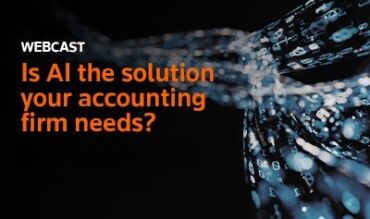As accounting firms look to differentiate themselves from the competition, one trend is leading the way: business advisory. From advising on mergers and acquisitions to specializing in accounting and advisory in your clients’ specific industry, there are many ways to take advantage of this unique opportunity.
What are business advisory services?
Business advisory services capitalize on the unique insight of accounting firms to make a profitable shift from serving clients as a once-a-year tax compliance processor to a year-round strategic business advisor.
Not only do business advisory services open up additional revenue streams, but they also enable more meaningful relationships with clients and a deeper sense of purpose in the services your accounting firm provides.
Making this transition, however, requires a change in mindset. Business advisory services are built into client engagements from the start and are centered upon the ways your firm can help clients achieve their goals. Some accounting firms choose to focus on serving a particular niche, like construction or M&A advisory, given they are familiar with the related business landscape.
Overall, business advisory services take your firm beyond the tax return and into the world of becoming a trusted and strategic partner to the clients you serve.
Is business advisory the same as consulting?
No. While business advisory and consulting are related, they are not the same.
Typically, business advisory is a long-term collaborative relationship over an extended period of time (often many years), while consultants come on board for short-term projects (usually 12 months or less) and provide specific recommendations which are then carried out by the client.
Because accountants already have the trust and knowledge of their clients, business advisory services are a great way to expand into additional revenue streams and provide a more comprehensive set of services. Consultants, on the other hand, don’t always have those deeper, more personal relationships.
In short, an accounting business advisor is closely involved in their clients’ long-term success, while a consultant provides guidance on a specific issue or short-term challenge.
Why should accountants become business advisors?
Today, technology can automate the entire tax compliance workflow. This means accountants no longer have to spend their time on manual activities like entering data, identifying blank fields, or searching for numbers that don’t add up. Instead, they can shift their focus to more value-added activities like providing financial insights and helping clients navigate the complexities of tax law.
Shifting to an advisory business model provides your clients with the guidance and support they are looking for, while enabling you and your staff to use your knowledge and experience to your advantage. Plus, becoming advisors can help some accounting staff stay with a firm instead of making a career change to another financial field.
Becoming a business advisor shifts your firm’s engagement strategy for new clients based on the value your firm brings to their business. The latest advances in technology can also help you analyze trends and support your clients with meaningful insight that helps their businesses grow and thrive. As you and your staff begin to understand the challenges and opportunities of your clients, you can swiftly identify additional opportunities to serve them effectively.
In the end, it’s all about transforming your firm from a tax compliance processor into a trusted, strategic advisor. By capitalizing on your unique knowledge and experience, you get a powerful combination that engages staff, strengthens client relationships, and boosts your bottom line.
How do you become a business advisor?
Accounting firms that offer business advisory services typically serve either one or a small number of niches. To be the most effective, clients often prefer that their accountants have insight into their market and can speak the language of their industry.
Acquiring industry specific knowledge takes time, effort, and experience. To be an effective business advisor, you should be thoroughly familiar with a given sector’s processes, risk factors, customer types, KPIs, and regulatory environment.
Accountants who advise the construction industry, for example, must understand seasonality, workforce planning, managing cash flow, multiple job sites, and much more. Accountants who collaborate with doctors need to know about billing and Medicare, and those who serve restaurants must understand food trends, delivery costs, and state laws regarding tipping. Concentrating on a business advisory niche enables your firm to develop this expertise.
Think about the businesses you file taxes for—have you developed a specialization within a particular segment or industry? If so, consider offering business advisory services to that specific niche.
How do you get into M&A advisory?
M&A advisory services are one of many specialized niches for accounting firms. In this business advisory role, your firm helps clients achieve higher returns for mergers, acquisitions, and divestitures by using a proven and repeatable approach for tax and accounting activities.
By identifying financial opportunities and risks when businesses enter into a sale, purchase, finance, or restructuring, accountants who offer M&A advisory services typically provide guidance to either buy-side or sell-side clients.
If you’ve previously collaborated with clients on the accounting or tax related aspects of a merger, acquisition, or divestiture, consider taking a deeper dive into offering M&A advisory services as a specialized niche.
Making the transition to advisory
In today’s challenging business landscape, making the move to business advisory services can set your firm apart—all while increasing revenue and strengthening client relationships.
By incorporating technology to automate manual tasks related to core tax compliance work, your accounting firm can free up time and refocus efforts on providing clients with value-added accounting and business advisory services. This shift is powerful as it capitalizes on your unique knowledge and insight, while positively impacting your clients’ business and financial lives. It also results in more meaningful work for you and your staff.
With a market-proven methodology, Thomson Reuters Practice Forward® offers content, tools, and guidance for forward-thinking accounting firms like yours who are interested in expanding into business advisory services. From helping your firm find your niche in specialties like construction or mergers and acquisitions, we can help you start your journey to accounting and business advisory services today.
For more information on advisory services, read “Accounting advisory: What you need to know.”









